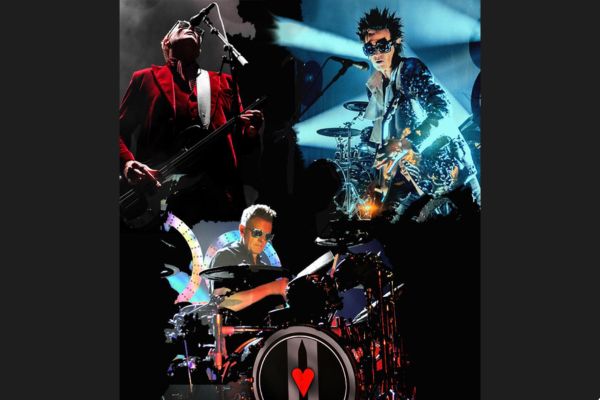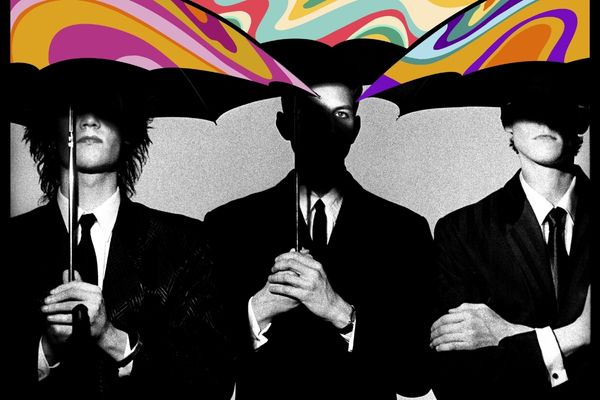Love And Rockets is the seminal, groundbreaking trio of Daniel Ash (vocals and guitar), David J (vocals and bass) and Kevin Haskins (drums). They formed in 1985 after the first split of their band Bauhaus. Love and Rockets provided a clean slate and an opportunity to plumb the depths of imagination and influences.
Named after the underground comic by the Hernandez brothers, the band made seven records over the course of thirteen years.
They announced themselves to the world with their radically unique take on the classic Temptations song “Ball Of Confusion”. This debut proved that they were going to be a force to contend with. It became a huge seller and a popular club hit in the US and Canada, where it also went gold.
It marked the beginning of a career that would span an impressive 14 years and 7 albums.
The release of their acclaimed debut album followed. Seventh Dream of Teenage Heaven was an unashamedly psychedelic adventure, far removed from the dark, angular soundscapes of Bauhaus. Yet they had to fight hard to avoid being branded ‘goth’, citing Syd Barrett, Marc Bolan and the later period Beatles as primary influences. The Quietus revisited the album on it’s 35th anniversary in 2015 and said “it’s its own thing, ruined elegance, sculpted beauty, sometimes sharp without being angry, often inspiring without being sappy, able to capture even slow dull moments in an attractive fashion.”
Their sophomore release Express followed in 1986. It is a unique, mystical and transcendental travelogue of sorts. The original press release for the album said that “the balance of light and dark, positive and negative, yin and yang, is a recurring theme”. In 2020, NPR, referring to the album, stated that their “psychedelic train ride laid the foundation for alt-rock”.
In 1987, the band’s third album, the acoustic leaning Earth, Sun, Moon was released and spawned the college radio hit “No New Tale To Tell”. It was described as “at once gutsy and rootsy yet also rhapsodic and uplifting”.
Everything changed for the band in 1989 when they released their self-titled fourth album. The song “So Alive” reached #3 on the Billboard Hot 100 and the album attained gold status. The song reached No. 1 in Canada and charted within the top 30 in Australia, and New Zealand. In the US, it was #1 on the Billboard Modern Rock Tracks chart for five weeks and was ranked No. 1 on that listing’s year-end chart for 1989. Billboard wrote that it was the “best T. Rex tune that Marc Bolan never wrote.”
After the release of this album, and a long worldwide tour, the band took some time to focus on their solo careers with Daniel Ash releasing his first solo album Coming Down in 1991 and Foolish Thing Desire in 1992, and David J releasing his third solo album Songs From Another Season in 1990 and Urban Urbane in 1992.
After what ended up being a five-year hiatus, the band reassembled for their fifth album Hot Trip To Heaven. Strikingly different from anything previous, the album has a diverse range of influences from twisted lounge jazz to ambient trance. With additional vocals by the celebrated Egyptian-Belgian singer Natacha Atlas, the album’s world music influences are evident. While the album was not a commercial success, it became a critical one with many writing then, and recently, that the album was brave and radical. Trouser Press called it “vital” and “a radical rethink, opening the trio’s sound to admit ambient and electronic influences”. New York Magazine said it was “hypnotic, glistening, dark and crashing.” The album was ahead of it’s time, pre-dating the electronic music revolution by a few years.
Having signed to Rick Rubin’s American Recordings label, the band was guided by the legendary producer in a return to more guitar-based songs for 1996’s Sweet F.A. The story of this album can’t be told without mentioning the album cover which features a striking photo of a burnt guitar which was retrieved from the debris after a fire broke out at Rubin’s mansion, where the band were living while working on songs for the album. They lost all of their gear, some of their demo recordings, and nearly their lives as well. They literally had to jump out of the windows to escape. The resulting album was inspired by some of their earliest influences – The Velvet Underground, The Stooges, The Doors, Can. It spins tales of passion and loss, carried on a fluid, moody throb. Undulating, hypnotic rhythms twine around melancholy lyrics which examine life at a primal level, as ethereal electronic effects play counterpoint to earthquake reverberating guitars. The track “Sweet Lover Hangover” was an alternative radio hit.
The band’s final album, was 1998’s Lift. Producer Doug DeAngelis (NIN, New Order, Michael Jackson) became almost a temporary honorary member, and helped shape the strong tracks which employed sequencers and sampling as well as some deep dub elements. Lift was released in the middle of a much anticipated Bauhaus reunion. That, and the demise of the label that released Lift led to the end of Love And Rockets.
They briefly reformed in late 2007 to play “ Should I Stay or Should I Go” by The Clash (twice) in Los Angeles at an event benefiting The Joe Strummer Foundation, and they performed at Coachella and Lollapalooza in 2008.
Since then, the legacy of the band has only grown, with more people realizing the extent of their influence, and generations of new fans discovering them. The list of artists who cite their influence is impressive, amongst them, The Flaming Lips, The Dandy Warhols, A Place To Bury Strangers, Janes Addiction, Black Rebel Motorcycle Club, Beck, Maynard Keenan, Dubfire and the Pixies. Their music has been used in films and TV, most recently Yellowjackets and Dexter:New Blood. Only time will tell if there will be any more chapters to their intriguing tale.


